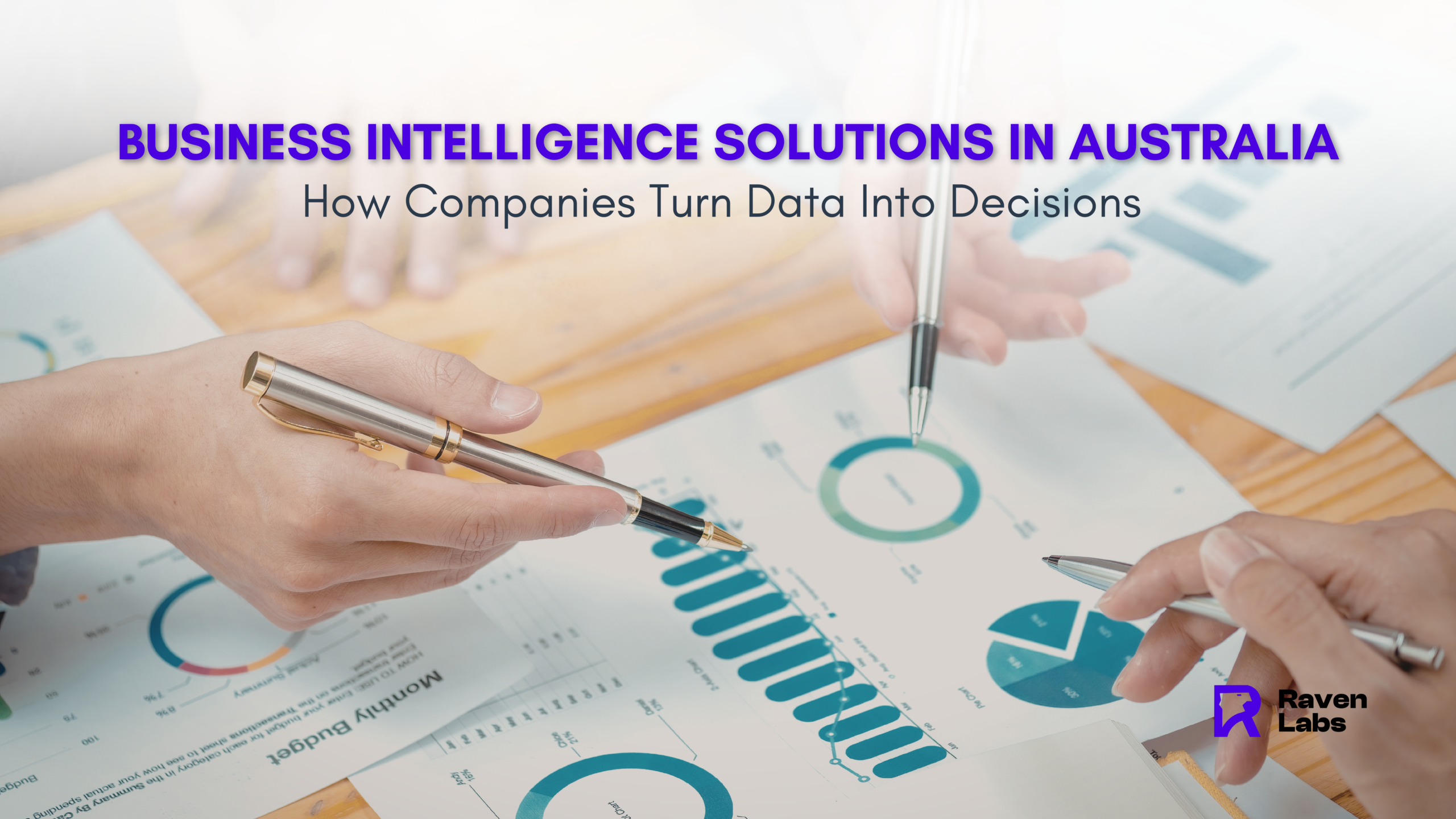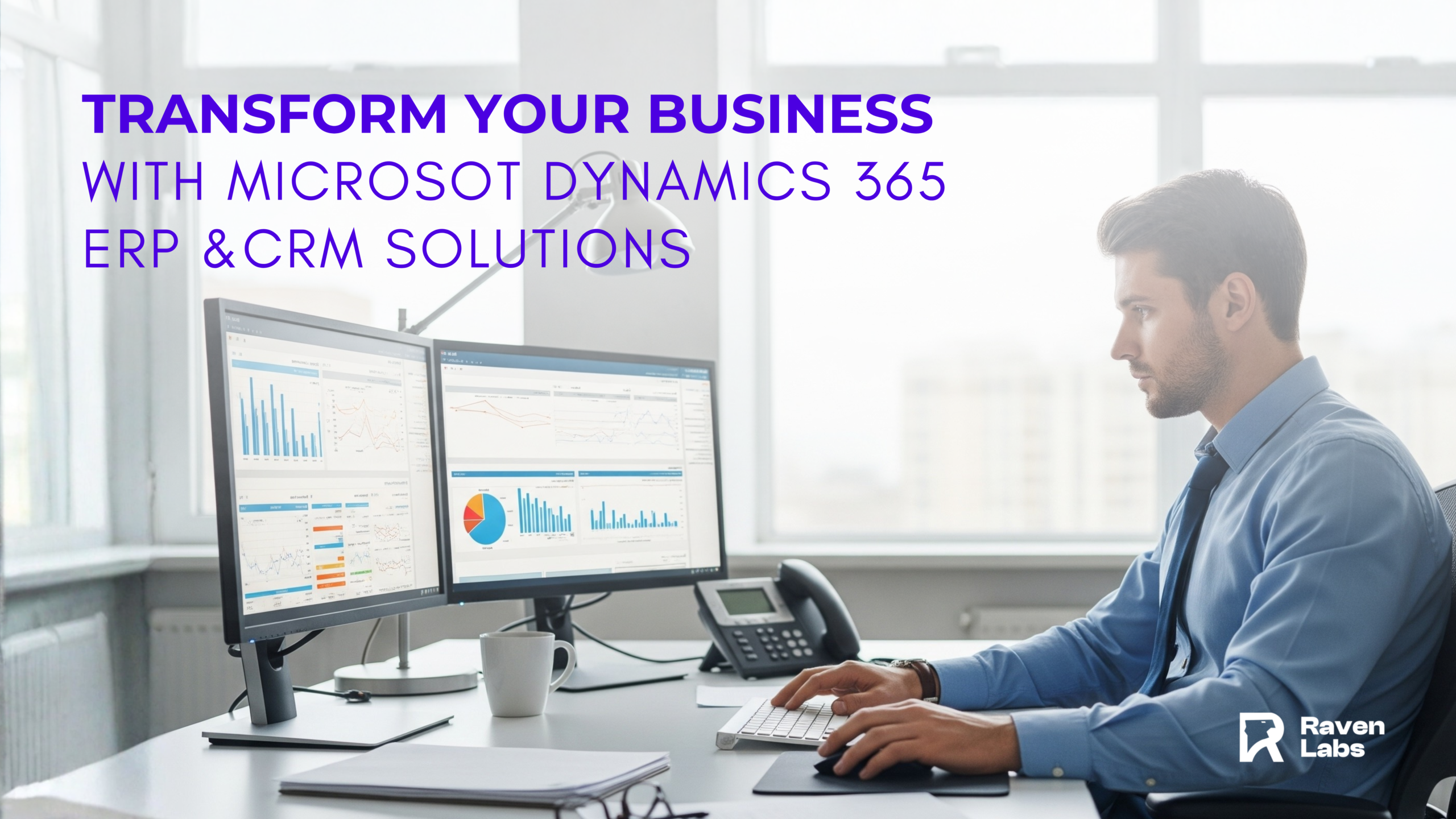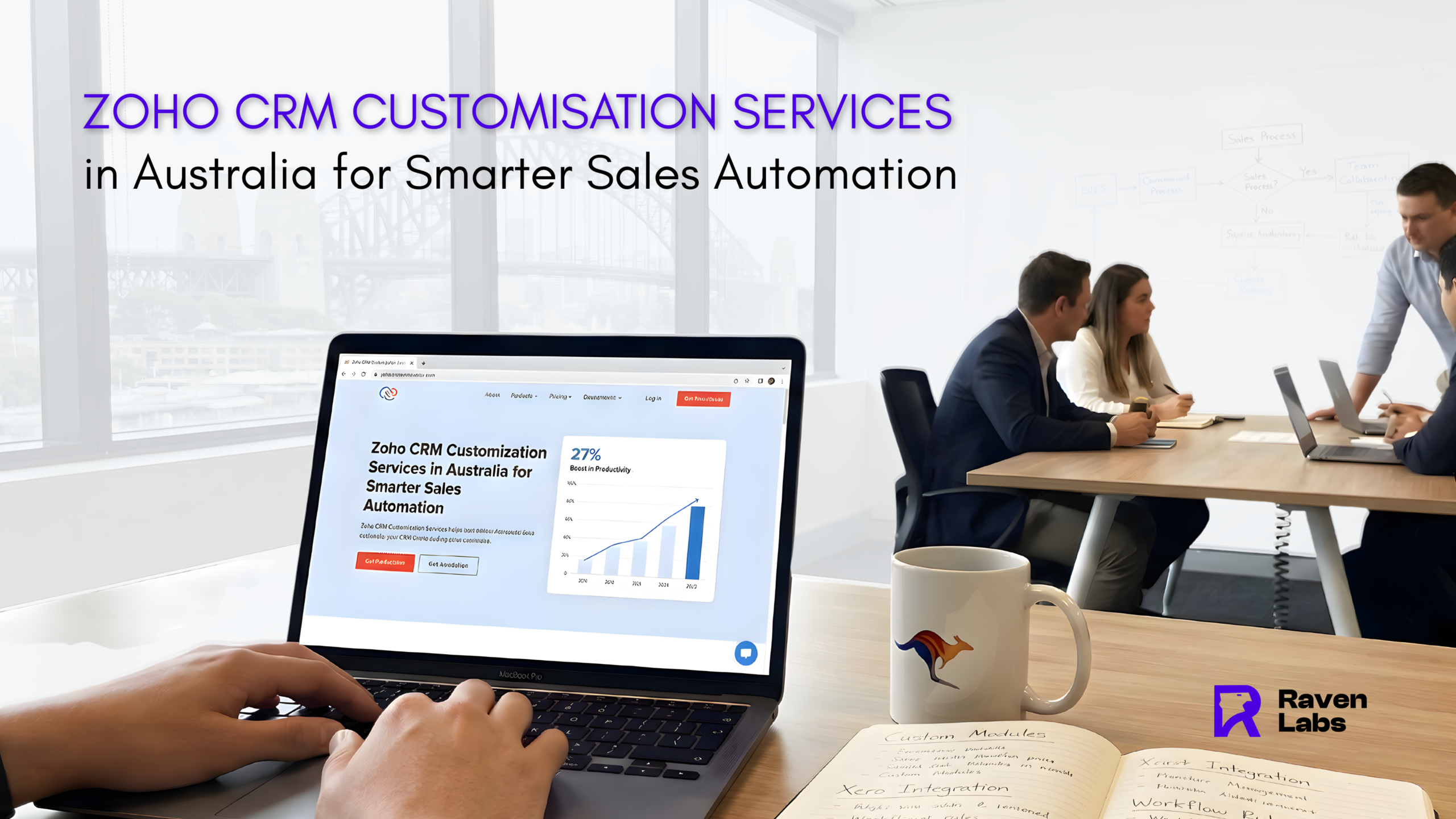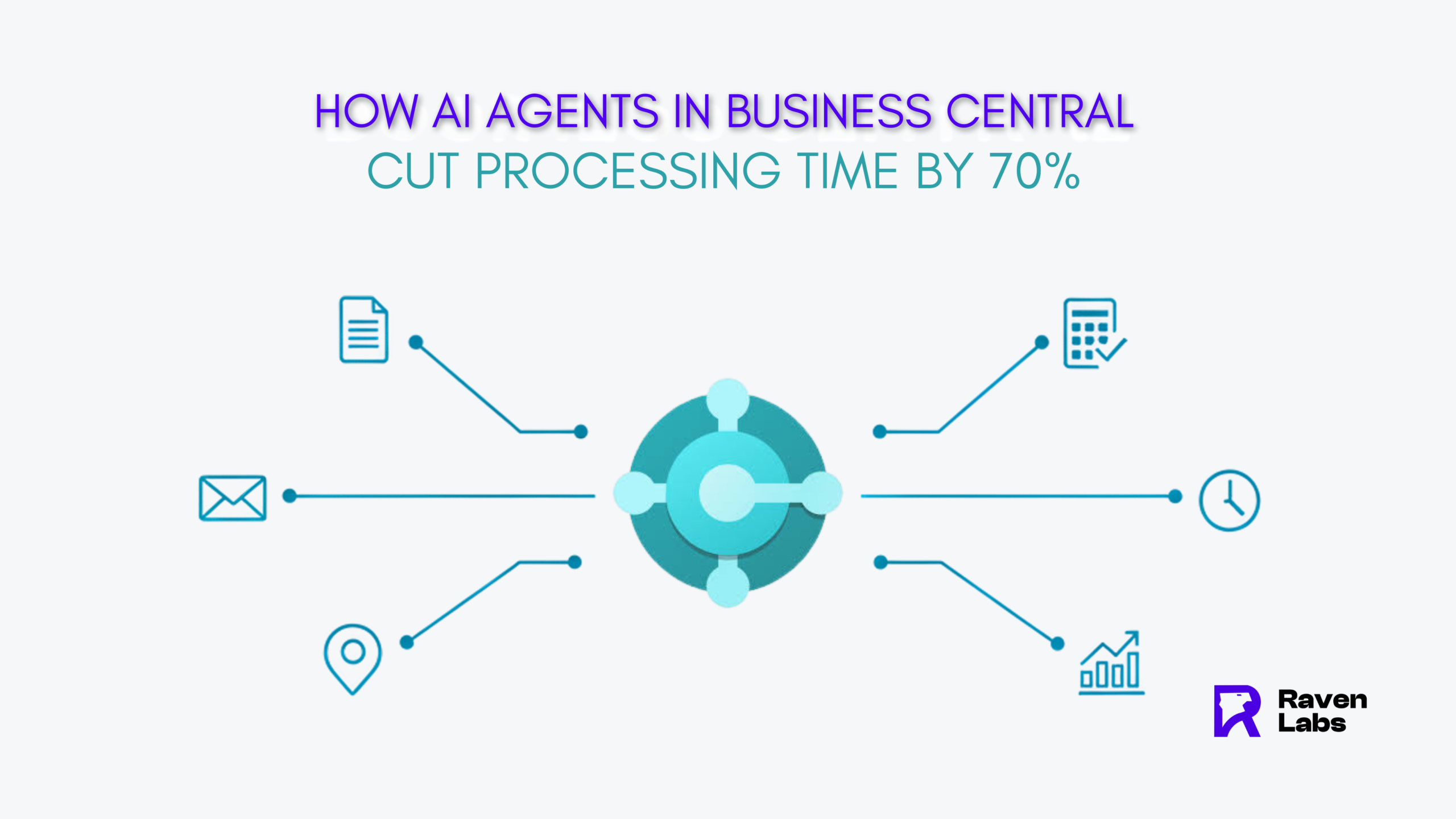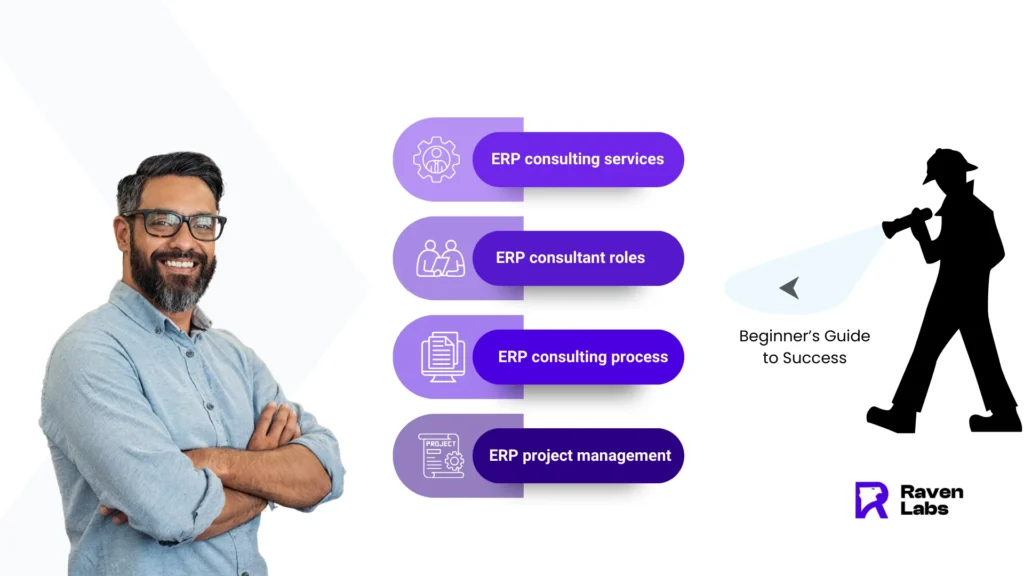
Introduction
Is your business striving for higher efficiency and growth? ERP consulting bridges the gap between your technology and your business objectives, guiding you through selection, implementation, and optimization of your enterprise resource planning (ERP) system.
Enterprise Resource Planning (ERP) systems have emerged as a critical tool for organizations looking to unify operations, gain real-time visibility, and improve decision-making. From Fortune 500 companies to small businesses, ERP has become a cornerstone of digital transformation.
However, choosing, implementing, and optimizing an ERP system is a significant undertaking that can either transform your business or create overwhelming challenges if done incorrectly. This is where ERP consulting comes in. An experienced ERP consultant acts as a trusted advisor, guiding organizations through every stage of the ERP lifecycle: from determining business requirements and selecting software to managing implementation, training users, and providing ongoing support for continuous improvement.
This beginner’s guide will help you understand the fundamentals of ERP consulting, the types of consultants you may work with, and how to select the right partner to ensure long-term success.
Whether you’re implementing ERP for the first time or optimizing an existing system, Raven Labs provides end-to-end expertise to ensure you achieve the highest ROI. Contact us today to get started.
What Is ERP Consulting?
ERP consulting involves professional advisory and implementation services focused on ERP systems – integrated platforms that help businesses manage day-to-day functions such as finance, HR, supply chain, procurement, manufacturing, sales, and customer service. An ERP consultant brings deep experience with ERP systems and best practices to help organizations optimize their operations.
The core purpose of ERP consulting is to ensure that your ERP system aligns with strategic goals and delivers measurable business value. This requires:
Assessing business needs and processes to identify ERP requirements
Recommending suitable ERP software based on industry, company size, and growth plans
Managing ERP projects to avoid delays, cost overruns, and inefficiencies
Configuring and customizing the platform to fit specific workflows
Ensuring user adoption through training and change management strategies
Example: If a manufacturing business is struggling with real-time inventory tracking, an ERP consultant might recommend an industry-specific manufacturing ERP solution with advanced warehouse management features and then oversee its deployment to eliminate stock discrepancies and improve inventory management.
Types of ERP Consultants
Choosing the right type of ERP consultant is critical to your project’s success. Each consultant type brings unique skills and perspectives to support your ERP implementation process.
Functional ERP Consultants
Functional consultants specialize in understanding business needs and mapping them to ERP functionalities. They typically have strong industry knowledge and focus on modules such as:
Finance & Accounting
Human Resources (HR)
Supply Chain Management (SCM)
Customer Relationship Management (CRM)
These ERP functional experts bridge the gap between technical teams and business stakeholders, ensuring ERP solutions meet operational objectives and drive process improvement.
Technical ERP Consultants
Technical consultants are the ERP system’s engineers. They work on:
Configuration & customization
Database management
Integration with existing software
Data migration
Security features and performance tuning
They ensure scalability, stability, and data security while enabling complex automations within the ERP system.
Implementation and Upgrade Consultants
These specialists handle:
Initial ERP deployments
Migrating from legacy systems
Upgrading to new ERP versions without significant downtime
Their main task is to reduce disruption and ensure system reliability during transitions, often working with cloud ERP solutions for enhanced flexibility.
Project Management ERP Consultants
Project managers handle budgets, timelines, resources, and risk mitigation. They maintain communication among stakeholders and ensure the implementation stays on track. An experienced project manager is crucial for coordinating the various aspects of an ERP project and driving it towards successful completion.
Example: For a multinational corporation adopting a new ERP system, the project management consultant coordinates teams across countries to maintain consistency in configuration and ensure value realization across the organization.
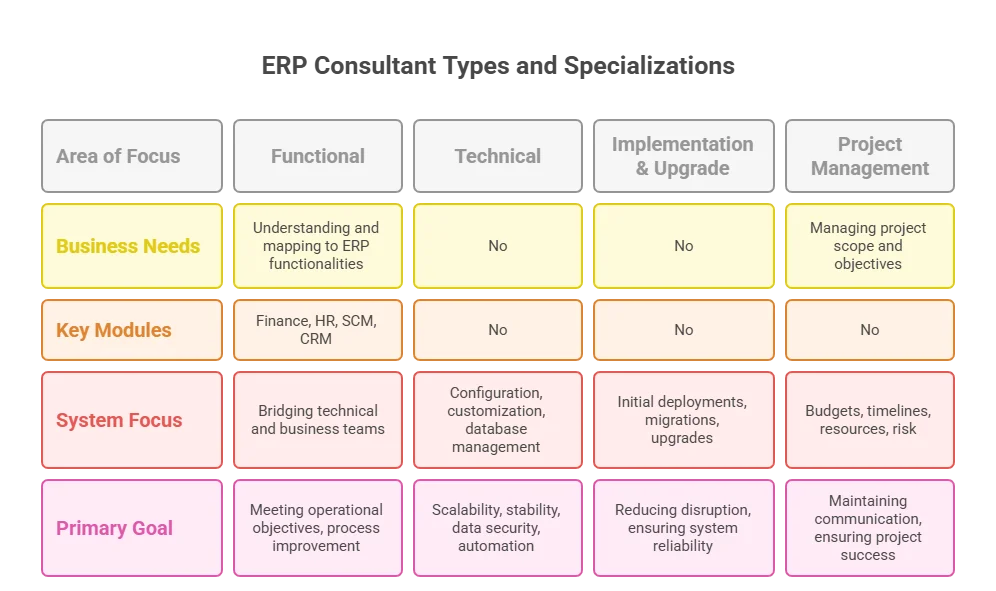
Explained: ERP Consulting Process
A successful ERP consulting project typically follows these key steps:
Conduct Needs Assessment and Discovery
ERP consultants identify your organization’s pain points, evaluate current workflows, and set clear objectives. This stage answers questions like:
What processes need improvement?
Which ERP modules are essential?
What compliance or regulatory requirements must be met?
This phase often involves detailed requirements gathering to ensure the ERP solution will meet all business requirements.
Select the Right ERP System
System selection is a critical step in the ERP project. ERP consultants consider:
Industry-specific functionality
On-premise vs. cloud-based deployment
Scalability and customization options
ERP vendor support and ecosystem
Total cost of ownership
The consultant will guide you through the vendor selection process, helping you choose between various ERP services and solutions.
Plan and Design ERP Implementation
A detailed roadmap is created with:
Resource allocation
Key milestones
Risk management strategies
Change management and communication plans
This stage sets the foundation for a smooth implementation process.
Implement and Configure the System
Consultants install and configure the ERP solution, customizing workflows and setting up integrations such as CRM, eCommerce, or analytics tools. This phase requires deep experience with ERP to ensure all components work together seamlessly.
Test and Validate ERP Performance
Testing ensures modules work as intended. Activities include:
Unit testing
User acceptance testing (UAT)
Load and performance testing
Thorough testing is crucial for identifying and resolving any issues before the system goes live.
Train Teams and Launch the System
Employee adoption is critical for ERP success. Consultants provide:
Role-specific training
Hands-on workshops
Manuals and helpdesk support
Effective training ensures users can leverage the full potential of the new ERP system.
Provide Post-Implementation Support
ERP consulting doesn’t end at go-live. Ongoing support includes:
Performance optimization
Troubleshooting
Adding new features or modules
Continuous support helps organizations maximize the value of their ERP investment over time.a
Benefits of ERP Consulting
Improve Business Efficiency
ERP consulting services help streamline core business processes, reduce manual work, and eliminate operational bottlenecks. Expert consultants analyze your workflows to identify areas for automation and optimization, leading to significant time efficiency gains.
Support Better Decision-Making
Professional ERP consulting enables data-driven decisions through real-time dashboards, analytics, and reporting. Consultants configure systems to deliver actionable insights when you need them, supporting strategic planning and operational improvements.
Ensure Scalability and Growth
Experienced ERP consulting partners ensure your system can scale and adapt as your organization evolves. They implement flexible solutions that support long-term business expansion, whether you’re a small business or a large enterprise.
Enhance Collaboration and Communication
ERP consulting services help centralize data and integrate systems, enabling seamless collaboration between departments. This breaks down silos and improves information flow across the organization.
Strengthen Compliance and Data Security
ERP consultants configure robust security controls and ensure systems meet industry regulations like GDPR, HIPAA, ISO standards, and other compliance requirements. They help implement best practices for data protection and risk management.
What is the Cost of ERP Consulting
Factors That Influence ERP Consulting Costs
Project scope and complexity level
Required customizations and integrations
Consultant expertise and experience
Implementation timeline requirements
Geographic location and market rates
Typical Pricing Models Used by Consultants
Hourly rate – Best for smaller advisory projects and ongoing support
Project-based – Fixed price for clearly defined deliverables
Retainer – Monthly fee for continuous optimization services
Consulting fees can vary widely based on these factors, but many organizations find that the cost savings and efficiency gains from a well-implemented ERP system far outweigh the initial investment.
How to Choose the Right ERP Consulting Partner
Evaluate Industry Expertise
Look for ERP consulting firms with proven experience in your specific business domain and industry. Their consultants should understand your unique challenges and have a track record of successful implementations in similar environments.
Check Software Specialization
Many ERP consulting services focus on specific platforms like SAP, Oracle, or Microsoft Dynamics. Choose one aligned with your chosen technology or seek an independent ERP consultant who can provide unbiased advice across multiple platforms.
Review Past Projects and References
Request detailed case studies and client references to validate their ERP consulting capabilities and results. Look for consultants with experience in both ERP selection and implementation to ensure end-to-end support.
Assess Change Management Capabilities
The right consultant ensures smooth implementation and high user adoption through effective change management. This is crucial for realizing the full value of your ERP investment.
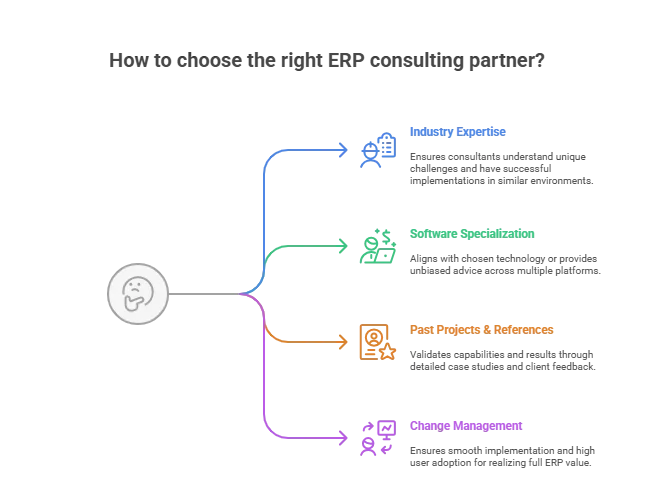
Frequently Asked Questions (FAQs):
What Does an ERP Consultant Do?
ERP consultants assess business needs, recommend systems, guide implementation, and optimize performance. They bring expertise in both business processes and ERP technology to help organizations maximize the value of their enterprise software.
How Long Does an ERP Implementation Take?
Small projects can take 3–6 months, while large-scale ERP rollouts may take 12–24 months. The timeline depends on factors such as project scope, customization requirements, and organizational readiness.
When Should a Business Hire an ERP Consultant?
Businesses should consider hiring an ERP consultant when selecting new ERP software, replacing outdated systems, or aiming for large process transformations. Independent ERP consultants can be particularly valuable during the software selection phase to ensure an unbiased evaluation.
What Skills Should an ERP Consultant Have?
Key skills for an ERP consultant include:
Business process expertise
ERP platform knowledge
Project management capabilities
Technical skills
Strong communication ability
Change management experience
Conclusion
ERP consulting is more than just implementing software; it’s about aligning technology with your business strategy and unlocking new levels of operational efficiency. By working with the right ERP consultant, you ensure your project is delivered on time, within budget, and ready to support your company’s growth for years to come.
If you’re ready to maximize ROI on your ERP investment and implement a system that truly works for your business, Raven Labs is here to help. Our team of expert ERP consultants combines deep industry knowledge, proven implementation methods, and a commitment to measurable results.
📞 Call us at: +61 432 913 392
📧 Email: info@ravenlabs.com.au
🌐 Visit: Raven Labs
